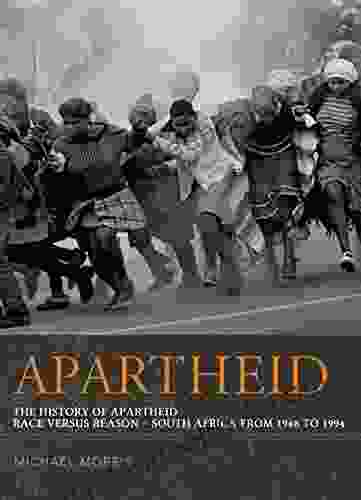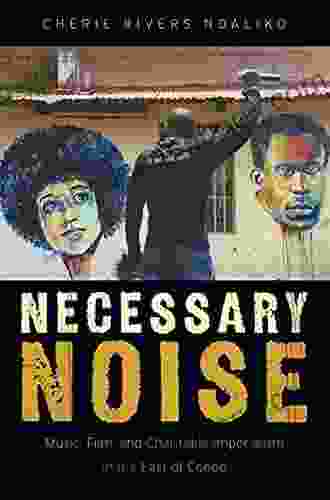The History of Apartheid: A Comprehensive Examination of Racial Segregation in South Africa

Apartheid, a system of racial segregation and discrimination that existed in South Africa from 1948 to 1994, stands as one of the most egregious examples of human rights violations in modern history. This oppressive system enforced the separation of people based on their race, resulting in widespread discrimination, inequality, and suffering. This article will delve into the intricate history of apartheid, tracing its origins, examining its implementation and consequences, highlighting the resistance it faced, and exploring the eventual dismantling of this abhorrent system.
4.6 out of 5
| Language | : | English |
| File size | : | 702 KB |
| Text-to-Speech | : | Enabled |
| Screen Reader | : | Supported |
| Enhanced typesetting | : | Enabled |
| Word Wise | : | Enabled |
| Print length | : | 192 pages |
Origins of Apartheid
The roots of apartheid can be traced back to the colonial era in South Africa. During the 17th century, the Dutch East India Company established a settlement at the Cape of Good Hope, which later became a British colony in 1806. From the outset, racial discrimination and segregation were deeply ingrained in the colony's society, with the indigenous population and slaves subjected to oppressive laws and practices.
In 1910, the Union of South Africa was formed, consolidating four British colonies. This new political entity further entrenched racial segregation through legislation such as the Natives Land Act of 1913, which restricted black Africans to specific areas of land. The subsequent decades witnessed the gradual implementation of a comprehensive system of racial separation, known as "segregation," which extended to all aspects of life, including education, housing, employment, and social interactions.
Implementation of Apartheid
After the National Party came to power in 1948, apartheid was formally implemented as a comprehensive system of racial segregation and discrimination. A series of laws, collectively known as the "apartheid laws," were enacted to codify and enforce this system. These laws included:
- Population Registration Act (1950): Classified all South Africans into four racial categories: White, Black, Coloured, and Indian.
- Group Areas Act (1950): Enforced residential segregation, forcing people to live in designated areas based on their race.
- Bantu Authorities Act (1951): Created separate "homelands" for Black Africans, known as bantustans, which were intended to be self-governing but were, in reality, impoverished and lacked basic infrastructure.
- Pass Laws: Restricted the movement of Black Africans within the country, requiring them to carry passes to enter certain areas and to work.
These laws created a rigid system of racial segregation and discrimination that permeated every aspect of South African society. Black Africans were denied basic rights, including the right to vote, own land, or receive equal education and employment opportunities. They were subjected to arbitrary arrests, detention, and violence by the security forces, and their lives were characterized by poverty, inequality, and oppression.
Consequences of Apartheid
The consequences of apartheid were devastating for the Black African population of South Africa. The system created a profound racial divide, with White South Africans enjoying the benefits of privilege and wealth while Black Africans faced discrimination, poverty, and social exclusion. The bantustans were notoriously underfunded and underdeveloped, leaving millions of Black Africans in squalid conditions with limited access to education, healthcare, and employment.
Apartheid also had a profound impact on the country's economy and international standing. The system's focus on racial separation and control stifled economic growth and innovation. South Africa became increasingly isolated from the international community, as many countries condemned apartheid as a violation of human rights. International sanctions and boycotts further exacerbated the country's economic problems.
Resistance and Struggle for Freedom
Despite the oppressive nature of apartheid, the Black African population in South Africa never gave up the fight for freedom and equality. From the outset, resistance movements emerged, challenging the system through non-violent protests, civil disobedience, and armed struggle. Notable organizations such as the African National Congress (ANC) and the Pan Africanist Congress (PAC) played a pivotal role in mobilizing the Black population and leading the struggle against apartheid.
The Sharpeville Massacre of 1960, in which 69 unarmed protesters were killed by police, marked a turning point in the resistance movement. The massacre sparked widespread international outrage and further galvanized the movement for change. In response to the escalating protests and resistance, the apartheid government resorted to increasingly repressive measures, including mass arrests, detentions, and state violence.
International Pressure and Negotiations
As the apartheid system came under increasing pressure from within and outside South Africa, the international community played a significant role in pushing for change. The United Nations repeatedly condemned apartheid as a violation of human rights and imposed sanctions on South Africa. Many countries and organizations supported the anti-apartheid movement and provided financial and political support to resistance groups.
In the late 1980s, the apartheid government, under the leadership of F.W. de Klerk, began to recognize the need for reform. In 1990, de Klerk unbanned the ANC and other political organizations, released political prisoners, and initiated negotiations with anti-apartheid leaders. These negotiations, known as the Convention for a Democratic South Africa (CODESA),brought together representatives from the government, the ANC, and other political parties to discuss a peaceful transition to a democratic and non-racial society.
Dismantling of Apartheid
The negotiations culminated in the adoption of a new constitution in 1993, which enshrined the principle of universal suffrage and established a multi-racial democracy. In 1994, the first multi-racial elections were held, resulting in the election of Nelson Mandela as the country's first Black president. The dismantling of apartheid was a historic moment, marking the end of a deeply oppressive and discriminatory system and the dawn of a new era for South Africa.
Legacy of Apartheid
While apartheid has been officially abolished, its legacy continues to shape South African society. The racial inequalities created by apartheid persist, and many Black South Africans continue to face discrimination and poverty. The government has implemented various policies aimed at addressing these inequalities, such as affirmative action programs and land redistribution initiatives. However, significant challenges remain in overcoming the legacy of apartheid and building a truly just and equitable society for all South Africans.
The history of apartheid is a sobering reminder of the devastating consequences of racial discrimination and segregation. The system's inhumane practices and violation of basic human rights left a lasting scar on South Africa and its people. The resistance and struggle for freedom against apartheid serve as a testament to the resilience and determination of the human spirit. The dismantling of apartheid and the transition to a democratic South Africa is a beacon of hope, demonstrating that even the most oppressive systems can be overcome through non-violent resistance and negotiation.
As we reflect on the history of apartheid, it is imperative that we learn from the mistakes of the past and work tirelessly to prevent such atrocities from ever happening again. By promoting equality, diversity, and human rights, we can create a world where all individuals are treated with dignity and respect, regardless of their race, ethnicity, or background.
4.6 out of 5
| Language | : | English |
| File size | : | 702 KB |
| Text-to-Speech | : | Enabled |
| Screen Reader | : | Supported |
| Enhanced typesetting | : | Enabled |
| Word Wise | : | Enabled |
| Print length | : | 192 pages |
Do you want to contribute by writing guest posts on this blog?
Please contact us and send us a resume of previous articles that you have written.
 Book
Book Novel
Novel Chapter
Chapter Text
Text Story
Story Reader
Reader Paperback
Paperback E-book
E-book Magazine
Magazine Newspaper
Newspaper Paragraph
Paragraph Glossary
Glossary Preface
Preface Synopsis
Synopsis Footnote
Footnote Manuscript
Manuscript Codex
Codex Tome
Tome Classics
Classics Library card
Library card Autobiography
Autobiography Thesaurus
Thesaurus Character
Character Librarian
Librarian Card Catalog
Card Catalog Borrowing
Borrowing Stacks
Stacks Periodicals
Periodicals Scholarly
Scholarly Reserve
Reserve Academic
Academic Journals
Journals Reading Room
Reading Room Interlibrary
Interlibrary Literacy
Literacy Study Group
Study Group Dissertation
Dissertation Storytelling
Storytelling Awards
Awards Reading List
Reading List Pramod Kesav N
Pramod Kesav N Stan Berenstain
Stan Berenstain Rick Mattingly
Rick Mattingly Msia Kibona Clark
Msia Kibona Clark John Wingate
John Wingate Michael Scheuer
Michael Scheuer Joel Carboni
Joel Carboni Cosmic Publications
Cosmic Publications Buzzy Jackson
Buzzy Jackson Eleni Kounalakis
Eleni Kounalakis Francis R Valeo
Francis R Valeo John W Budd
John W Budd Jess Lebow
Jess Lebow Samantha Whiskey
Samantha Whiskey Lisa Moser
Lisa Moser Michelle Tea
Michelle Tea Clara Loveman
Clara Loveman Patsy Rodenburg
Patsy Rodenburg J D Strange
J D Strange David Revill
David Revill
Light bulbAdvertise smarter! Our strategic ad space ensures maximum exposure. Reserve your spot today!
 Pat MitchellFollow ·17.5k
Pat MitchellFollow ·17.5k Will WardFollow ·7.1k
Will WardFollow ·7.1k Jaylen MitchellFollow ·10.6k
Jaylen MitchellFollow ·10.6k Leslie CarterFollow ·8.4k
Leslie CarterFollow ·8.4k Phil FosterFollow ·2.3k
Phil FosterFollow ·2.3k Ivan CoxFollow ·4.1k
Ivan CoxFollow ·4.1k Devin RossFollow ·19.5k
Devin RossFollow ·19.5k Mario BenedettiFollow ·7.4k
Mario BenedettiFollow ·7.4k

 Ralph Ellison
Ralph EllisonHealth Care Global Viewpoints: Samantha Whiskey
Samantha Whiskey is a global health...

 Gabriel Garcia Marquez
Gabriel Garcia MarquezTeacher Educators' Reflections on Culturally Relevant...
In today's...

 Levi Powell
Levi PowellSustainable Project Management: The GPM Reference Guide...
In today's rapidly changing world,...

 Isaac Bell
Isaac BellThe Captivating World of "Dreaming Awake Falling Under"
A Journey Through...

 Clarence Brooks
Clarence BrooksGovernance Regulations Valuations Mergers And...
In today's complex and ever-changing...
4.6 out of 5
| Language | : | English |
| File size | : | 702 KB |
| Text-to-Speech | : | Enabled |
| Screen Reader | : | Supported |
| Enhanced typesetting | : | Enabled |
| Word Wise | : | Enabled |
| Print length | : | 192 pages |














